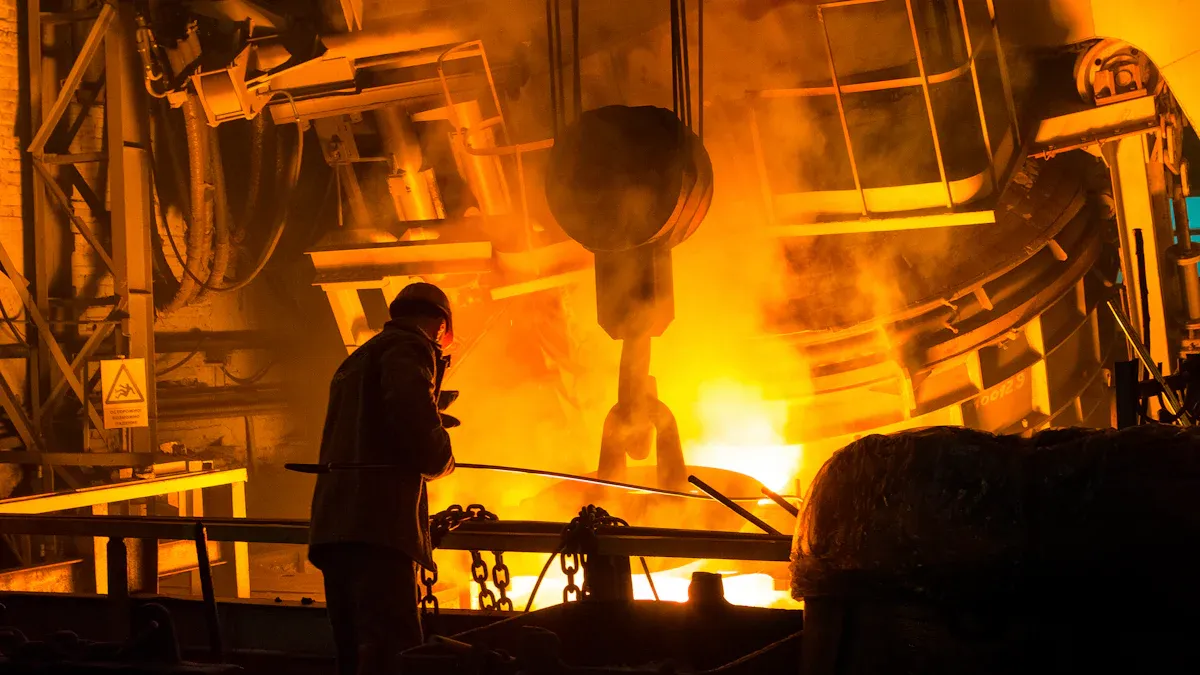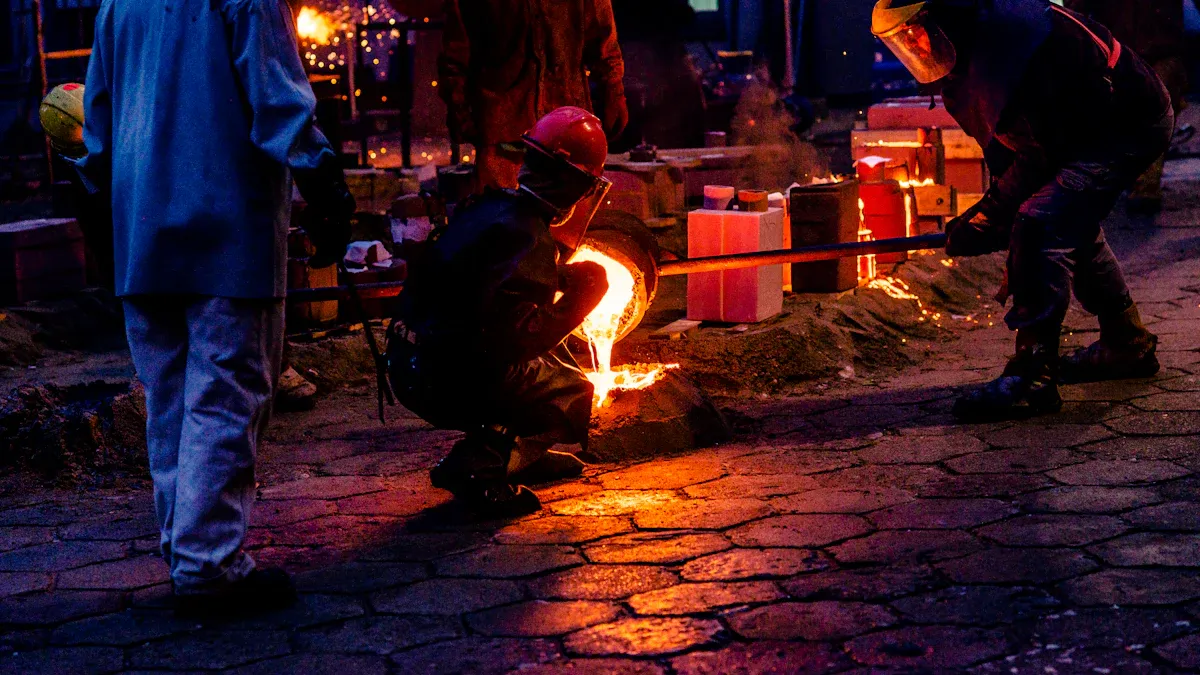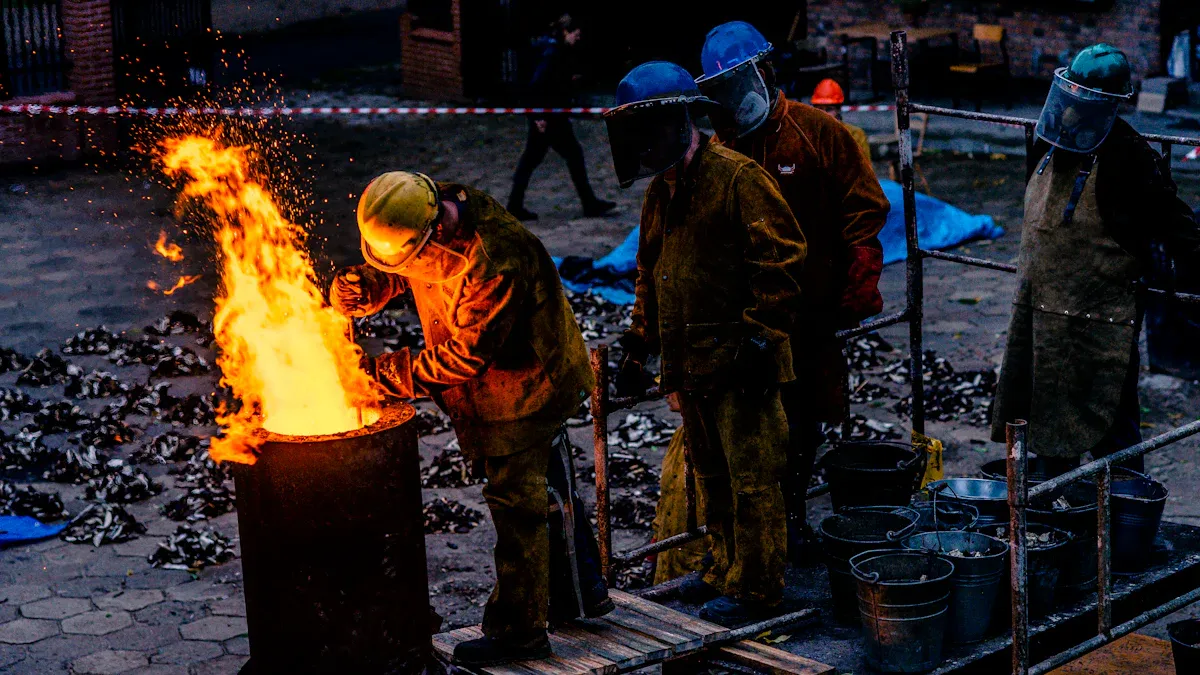
Precision plays a vital role in silicon brass precision casting. Every detail matters, from selecting the right materials to ensuring flawless execution. Advanced techniques paired with rigorous quality control guarantee exceptional results. Ningbo Pingheng Machinery Co., Ltd., a trusted silicon brass precision casting plant, excels in delivering high-quality outcomes through its expertise in silicon brass investment casting.
Key Takeaways
- Getting the mold ready is key for good casting. Pick strong materials and keep the mold clean for better results.
- Manage melting heat and pouring carefully for accurate shapes. Use modern tools to control heat and pour smoothly.
- Use proper cooling and finishing to avoid mistakes. Careful checks make sure each casting is up to standards and satisfies customers.
Step 1: Mold Preparation in Silicon Brass Precision Casting

Mold preparation is the foundation of successful silicon brass precision casting. A well-prepared mold ensures the final product meets the desired specifications with minimal defects. Let’s explore the key aspects of this critical step.
Selecting the Ideal Mold Material
Choosing the right mold material is essential for achieving precision. The material must withstand high temperatures and maintain its integrity during the casting process. For silicon brass precision casting, materials like ceramic or sand are often preferred due to their durability and heat resistance. Ningbo Pingheng Machinery Co., Ltd. uses advanced investment casting techniques, ensuring the molds are compatible with silicon brass alloys for optimal results.
Ensuring Mold Accuracy and Cleanliness
Accuracy and cleanliness play a significant role in mold preparation. Even minor imperfections can lead to defects in the final casting. Before use, molds should be thoroughly inspected and cleaned to remove any debris or residue. This step ensures a smooth surface finish and prevents contamination. Regular maintenance of molds also extends their lifespan, reducing production costs over time.
Designing Molds for Optimal Silicon Brass Casting
A well-designed mold enhances dimensional accuracy and minimizes errors. Key design principles, such as optimizing the gating system, significantly impact the casting process. For instance:
- Iterative design approaches refine the mold structure for better results.
- Machine learning tools explore design possibilities, improving efficiency.
- Continuous observations reduce uncertainties, ensuring consistent quality.
| Evidence Description | Key Findings |
|---|---|
| Procedure for optimal design and technological solutions | Emphasizes the importance of gating system design in minimizing deviations in dimensional accuracy. |
| Regression equation linking gating system parameters | Provides a method for experimental optimization to improve casting accuracy. |
Ningbo Pingheng Machinery Co., Ltd. incorporates these advanced design principles to deliver high-quality silicon brass precision casting products. Their expertise ensures every mold is tailored to meet specific requirements, resulting in flawless outcomes.
Step 2: Melting and Pouring Techniques for Silicon Brass Precision Casting

Melting and pouring are critical steps in silicon brass precision casting. These processes determine the alloy’s quality and the final product’s accuracy. By following precise techniques, manufacturers can achieve exceptional results.
Choosing High-Quality Silicon Brass Alloys
The foundation of any successful casting lies in the alloy’s quality. High-quality silicon brass alloys ensure durability and reduce the risk of casting failures. Manufacturers often rely on custom alloys to overcome challenges that standard materials cannot address. Advanced metallurgical analysis verifies the alloy composition, ensuring it meets design specifications. For instance:
| Evidence Description | Impact on Casting Failures |
|---|---|
| Custom alloys can overcome manufacturing challenges when standard alloys fail. | Reduces the likelihood of component failure. |
| Quality assurance testing identifies issues early in the design and manufacturing process. | Helps in maintaining optimal quality and meeting design specifications. |
| Advanced metallurgical analysis techniques are employed to verify alloy compositions. | Ensures desired characteristics of alloys are achieved. |
| Belmont Metals has a failure rate of less than one percent with new castings from custom alloys. | Indicates high reliability and quality of the new alloy. |
Ningbo Pingheng Machinery Co., Ltd. uses only premium silicon brass alloys, ensuring their products meet the highest standards of quality and reliability.
Maintaining Precise Melting Temperatures
Temperature control is crucial during the melting process. Silicon brass requires a specific temperature range to achieve the right consistency. Overheating can degrade the alloy, while insufficient heat may lead to incomplete melting. Manufacturers use advanced equipment to monitor and maintain precise temperatures. This ensures the alloy retains its desired properties, resulting in a flawless casting.
Controlled Pouring for Dimensional Accuracy
Pouring molten silicon brass into molds requires precision. A controlled pouring process minimizes turbulence, which can cause defects like air pockets or uneven surfaces. Manufacturers often use automated systems to regulate the flow rate, ensuring consistent results. Ningbo Pingheng Machinery Co., Ltd. excels in this area, employing state-of-the-art techniques to achieve dimensional accuracy in every casting.
By mastering these melting and pouring techniques, manufacturers can produce high-quality silicon brass precision casting products that meet even the most demanding requirements.
Step 3: Cooling and Finishing in Silicon Brass Precision Casting
Cooling and finishing are the final steps that bring silicon brass precision casting to life. These processes ensure the castings are free from defects and meet the highest standards of quality.
Effective Cooling Methods to Prevent Defects
Cooling plays a vital role in shaping the final product. Proper cooling prevents defects like warping or cracking and enhances productivity. Manufacturers use advanced cooling techniques to control the rate at which the molten alloy solidifies. For example:
- Adjusting cooling rates influences the solid shell thickness and mushy zone characteristics.
- Increasing secondary cooling intensity improves casting quality significantly.
- Optimized cooling scenarios extend mold life and reduce process failures.
Ningbo Pingheng Machinery Co., Ltd. employs cutting-edge cooling methods to ensure flawless silicon brass precision casting results. Their expertise in managing cooling rates guarantees consistent quality and durability.
Removing Excess Material and Achieving a Polished Finish
Once the casting cools, excess material must be removed to achieve a polished finish. Techniques like grinding, sanding, and machining refine the surface and enhance dimensional accuracy. A smooth finish not only improves aesthetics but also ensures the product functions as intended. Ningbo Pingheng Machinery Co., Ltd. uses advanced finishing tools to deliver castings with impeccable precision and polish.
Conducting Rigorous Quality Control and Final Inspections
Quality control is the cornerstone of silicon brass precision casting. Rigorous inspections ensure every product meets design specifications and industry standards. Common inspection methods include:
| Type of Inspection/Testing | Description |
|---|---|
| Dimensional | CNC-CMM, LMM, Profile Projector, Digital Height Gauge, Inspection Gauges |
| Specialized | Non-Destructive Tests (X-ray, Ultrasonic, Dye Penetrant), Hydro Test, Millipore Cleanliness Test, Static Balancing |
Ningbo Pingheng Machinery Co., Ltd. conducts comprehensive inspections using state-of-the-art equipment. Their commitment to quality ensures every casting is flawless and ready for use.
By mastering cooling, finishing, and quality control, Ningbo Pingheng Machinery Co., Ltd. delivers silicon brass precision casting products that exceed expectations.
Perfecting silicon brass precision casting involves three essential steps: mold preparation, melting and pouring, and cooling and finishing. Each step demands precision and attention to detail. Quality control ensures flawless results every time. Ningbo Pingheng Machinery Co., Ltd. stands out as a trusted leader, combining expertise with advanced processes to deliver exceptional castings.
FAQ
What makes silicon brass ideal for precision casting?
Silicon brass offers excellent strength, corrosion resistance, and machinability. These properties make it perfect for creating durable and precise components. Ningbo Pingheng Machinery Co., Ltd. specializes in casting this alloy.
How does Ningbo Pingheng Machinery Co., Ltd. ensure quality in its castings?
The company uses advanced techniques, rigorous inspections, and high-quality materials. Their commitment to precision ensures every casting meets industry standards and customer expectations.
Can silicon brass castings be customized?
Yes! Ningbo Pingheng Machinery Co., Ltd. tailors castings to meet specific requirements. They work with various national standards and materials to deliver customized solutions.
